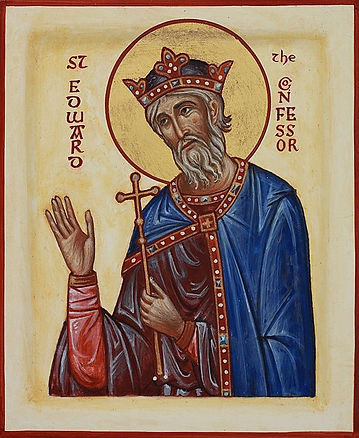.jpg)
Expulsion of the Jews by Edward I of England. British Library, Public domain, via Wikimedia Commons
England and the Jews. Why there has been no English monarch since Edward the Confessor
England and the Jews Video

Departure of Abraham for Canaan. Jacopo Bassano, Public domain, via Wikimedia Commons
God’s original blessing to Abraham, when he left Ur of the Chaldees to go to Canaan, was as follows:
[Gen 12:3 KJV] 3 And I will bless them that bless thee, and curse him that curseth thee: and in thee shall all families of the earth be blessed.
There is a curse that is upon those who curse the children of Abraham. Similarly in Matthew 25 Jesus pronounces woes upon those who trouble his brethren (the Jewish people).
[Mat 25:32, 41 KJV] 32 And before him shall be gathered all nations: and he shall separate them one from another, as a shepherd divideth [his] sheep from the goats: ... 41 Then shall he say also unto them on the left hand, Depart from me, ye cursed, into everlasting fire, prepared for the devil and his angels:
Throughout history we can see a pattern in the rise and fall of nations according to how they have treated the Jews.

The first Anglo-Saxon king to style himself as the King of the English was Alfred the Great. He ruled from 871 to 886 AD and he was from the House of Wessex. Alfred was possibly the greatest king the English have had. His heart was for God and he desired to learn and grow in the knowledge of God. He translated many works into English including the first fifty Psalms. His biographer was a devout Welsh monk called Asser who he invited to his court to help in the task of educating the English. Alfred was dismayed that the levels of literacy and bible knowledge were negligible in England at the time. He invited many scholarly people to his court to help him improve the level of education in his kingdom. Asser wrote this of Alfred:
“…he used to moan and sigh continually because God had created him lacking in divine learning and knowledge of the liberal arts.”
Asser likened Alfred to Solomon who sought wisdom from God.
Statue of Alfred the Great at Winchester. Odejea, via Wikimedia Commons

With such a great and godly monarch one would have imagined a great future for the House of Wessex. However, reading Asser’s biography we can see the anti-semitism that was rife at the time. Asser describes an act of treachery in his biography and describes it as being “in the manner of the Jews”. At this time in history Jews were routinely described as treacherous and “Christ killers”. Unfortunately this strain of anti-semitism did not leave the house of Wessex. The last Anglo-Saxon king was Edward the Confessor who ruled from 1042 to 1066. He is often regarded as pious and saintly. However he was responsible for laws which stated that the Jews and all they possessed belonged to the king. The Crown could appropriate their persons, wives, children and wealth.
These laws opened the way for the Jews to be incessantly victimised in the coming years.
It is interesting to note that since Edward the Confessor there has never been another English monarch of England. The following chart demonstrates this.
Edward the Confessor. Aidan Hart, via Wikimedia Commons


Despite the demise of the House of Wessex things continued to get worse for the Jews of England. The persecution of the Jews continued to be asserted by succeeding royal houses. When a Jew died the king asserted his right to all of his property and effects. His family could only inherit his estate upon the payment of a large fine. If a Jew converted to Christianity all his estate was seized by the Crown. The twisted reason for this was that it proved the sincerity of his conversion. King John, a Plantagenet king who ruled from 1199 to 1216, ordered all Jews to be imprisoned until they made a full declaration of all their estate. They were then horribly tortured and huge sums of money were extorted from them.
This situation continued until the Jews were finally expelled from England by Edward I. He published an Edict of Expulsion in 1290 expelling all Jews from England. This remained in place for the rest of the middle ages.
King John reluctantly signing the Magna Carta. Arthur C. Michael (d. 1945), Public domain, via Wikimedia Commons
.jpg)
The Jews were only allowed to return to England by Oliver Cromwell in 1655. His reason for allowing them back was that if they were not allowed back they could not hear the gospel and consequently could not be converted. He believed the Jews had to be converted before Christ could return. However they were not allowed to become fully “naturalised” citizens until the passing of the Naturalisation Bill in 1753. Full equality for Jews was not achieved until 1858 when full equality was conceded and Jews were allowed to stand for parliament.
My final point is that the blessing and curse pronounced by God remains. The House of Wessex is no more. The English have never since had an English king. The House of Plantagenet is no more. The Jews continue and since their low point in the middle ages they have grown in numbers and influence despite many efforts to destroy them.
You can find a more detailed account of the persecution of the Jews in Dr H Grattan Guinness’ book Light for the Last Days
Oliver Cromwell by Samuel Cooper, Public domain, via Wikimedia Commons